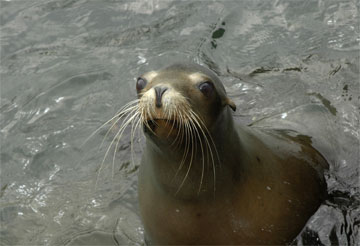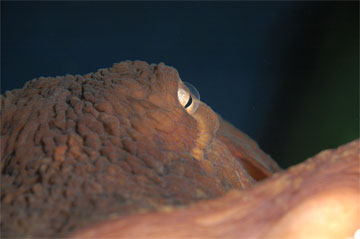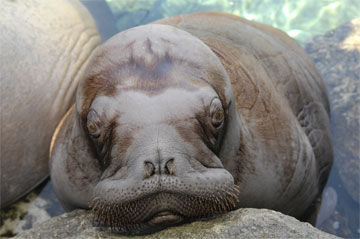Rock star or marine biologist? How about both
Rock star or marine biologist? Hans Walters chose both
By Julie and Megan Maher, special to mongabay.com
July 31, 2008
There aren’t many who swim with sharks by day and rock out on a stage at night, but Hans Walters does just that!
A man with two distinctly different passions, music and marine biology, Walters is a supervisor for the animals at the New York Aquarium, and then after hours, grabs a microphone as lead singer (playing just enough guitar to be dangerous) for the New York-based hard rock band, 61/49.
Walters works at the Aquarium, one of the five wildlife facilities in New York that are part of the Wildlife Conservation Society, where he practices his first passion, marine biology, which is the study of ocean life including all the living organisms that fill the sea. He manages the keepers and wildlife at the Sea Cliffs exhibit, a rocky, wet place that walruses, octopus, northern fur seals, California sea lions, sea otters, and South African penguins all call their home.
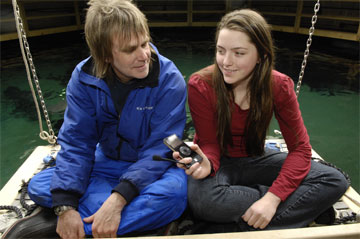 Megan Maher interviewing Hans Walters at the aquarium. Photo by Julie Larsen Maher. |
Walters is also in charge of the Aquarium’s shark exhibit where working with these incredibly cool ocean predators is his personal favorite. He literally swims with the fishes, SCUBA diving with sand tiger and nurse sharks as well as sea turtles.
Walters’ work world is outdoors. The Aquarium is located right on the Coney Island Beach in Brooklyn. Walters spends most of his day within the Aquarium, but sometimes he’s out in the Atlantic Ocean itself, working on systems that allow the salty sea waters of the ocean into the Aquarium for the marine animals in his care. He likes the mix of nature and institution, where casual dress and neoprene wetsuits are his occupational attire, both styles complimenting his spikey blonde hair.
Walters has loved marine biology for as long as he can remember, especially sharks. His first oceanographic position was performing creel censuses (so-named because a creel is the box where the fish are placed once they are pulled from the water) for the National Marine Fisheries Service. Walters interviewed fishermen to research their “catch of the day”. If the fishermen agreed, Walters would obtained weights and measurements of the fish and record the various species. The information he gathered was used to assess the general health and status of a fish population in a given location.
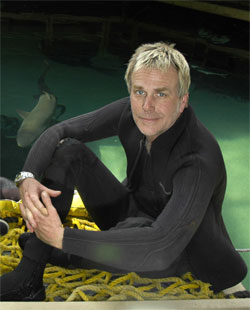 Hans Walters. Photo by Julie Larsen Maher. “I have met a lot of people who have said to me, ‘I always wanted to be a marine biologist’ or ‘a rock n’ roll singer’ followed by the caveat ‘but…’ I am happy to say I have never uttered the words ‘I always wanted to be…but…'” |
Although he completed college with a degree in marine biology, Walters first followed his musical interest into the rock and roll industry. He soon found that (although he truly loved rock and roll) as a career choice, it did not provide a secure income.
“If you want to be in the music industry, you can’t care about what kind of music you play. If you want to play a specific type of music, like hard rock, then you won’t really get as much work as if you are willing to pursue any kind of music gig,” says Walters.
In Walters’ case, he had the heart for hard rock, and his band, called ZToys, hit it hot in the 1980’s. ZToyz opened concerts for other notable rock and roll greats from that time period including the Ramones, Blue Oyster Cult, Foghat, Zebra, and Humble Pie.
Today, Walters is lead singer for a new hard rock band called 61/49, named after an intersection of two highways in Clarksdale, Mississippi, where in the 1930’s, a famous blues musician named Robert Johnson allegedly sold his soul to the devil in search of fame and fortune. Johnson’s musical vision enlightened future generations to rock and roll in the 1960’s, thirty years after his death.
Walters compares his voice and band sound to an updated version of some of America’s greatest hard rock bands like AC/DC, Bad Company, Guns n’Roses, and Twisted Sister (Dee Snider is a personal friend and colleague.)
Although his singing was successful (Walters loves performing and recording), he did not find it profitable, and so music became his lifelong hobby, not his livelihood.
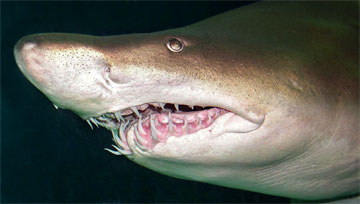
|
“When I looked at music as a business, it took all the fun out of it for me. Now, writing, recording, and performing live as a hobby is a blast,” declares Walters.
One passion had to take precedence over the other. Walters made his first priority marine biology because it provided him with a more financial stability than his rock and roll career.
Walters points out that mentally, there are differences between his two professions. Science is more of an intellectual pursuit, and music is emotional one.
“Working at the New York Aquarium and being a rock and roll singer can also share similarities because in both jobs, I am in the eye of the public. At the Aquarium, I can educate visitors about the wildlife in our care, and as a musician, I entertain people,” Walters says.
Both passions are physically demanding because rock singer and marine biologist jobs both require lots of strength and energy. As a rocker, he sings and dances, keeping him fit.
“Music is a contact sport. As a rock and roll singer, I love loud music and moving all over the stage,” he says.
Lifting live animals at the Aquarium provides the buff benefit for Walters. Walruses can weigh up to 3000 lbs.!
Creature care takes Walters’ continuous consideration every day. He has to remember that even though the animals are in the Aquarium, they have wild instincts. He respects their natural habits, and together with his staff, provides activities for the animals that are similar to things they would do in the wild. One enrichment activity the keepers use is to place fish inside a large plastic ball covered with holes. The walruses figure out how to find their treats, similar to fishing for their food in nature.
Walters also finds time for fieldwork to practice marine biology by studying sharks in the sea. He travels to South Carolina, near Myrtle Beach, where he attaches pop-up satellite transmitters to sand tiger sharks in the Atlantic Ocean. The data that the sharks collect while swimming is emailed by satellite back to Walters’ computer, a virtual “My Space” for sharks. Walters processes the scientific findings that he hopes will help protect the sharks and their marine habitat.
Even though being a rock star is awesome, Hans Walters has proven that science geeks can be cool.
